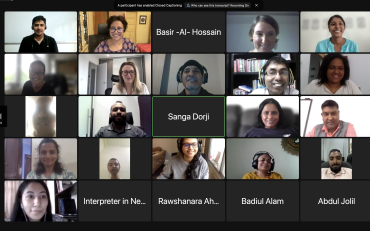The International Disability Alliance (IDA), with UNICEF and the United Nations Economic and Social Commission for Asia and the Pacific (UNESCAP) organized an online consultation on the regional mapping of social protection schemes and publicly funded support services for persons with disabilities in South Asia.
Thirty-three representatives of organizations of persons with disabilities (OPDs) from Bangladesh, Bhutan, India, Maldives, Nepal, Pakistan and Sri Lanka who previously engaged in advocacy around disability-inclusive social protection attended the event. The session centered around the draft report “Mapping of disability-inclusive social protection across South Asia: A regional synthesis report on social protection, including access to publicly funded support services for persons with disabilities including children across the life cycle” developed by Development Pathways. It sought to engage OPDs in meaningful consultations around the document to ensure that it properly reflected the reality and experiences of the sector.
The two-hour online session began with a brief recap on disability-inclusive social protection as understood in the Convention of the Rights of Persons with Disabilities (CRPD) as well as the Joint Statement towards social protection systems supporting the full and effective participation of persons with disabilities facilitated by ILO and IDA in 2019. Participants were separated into country based breakout rooms and reflected on the social protection schemes available for persons with disabilities in their respective countries. They also highlighted some of the challenges and incidents of exclusion they faced from mainstream social protection schemes, as well as the impact of the COVID-19 pandemic. OPDs from Sri Lanka shared the impact of the economic and political turmoil in the country on social protection for persons with disabilities. Countries with federal structures discussed the disparities between national and provincial programmes. Shared reflections included procedural bottlenecks, lack of disaggregated data, insufficient budget allocations and lack of monitoring mechanisms in social protection programmes.
The event was supported by language interpretation in Nepali and Bengali, national Sign Language interpretation and CART. The mapping report was circulated among the participants ahead of the meeting to give them an idea about the content which was helpful for them to participate in the consultation meaningfully. IDA is supporting the collation of written submissions to further bolster the report which will be a significant tool for OPD advocacy in the region.

